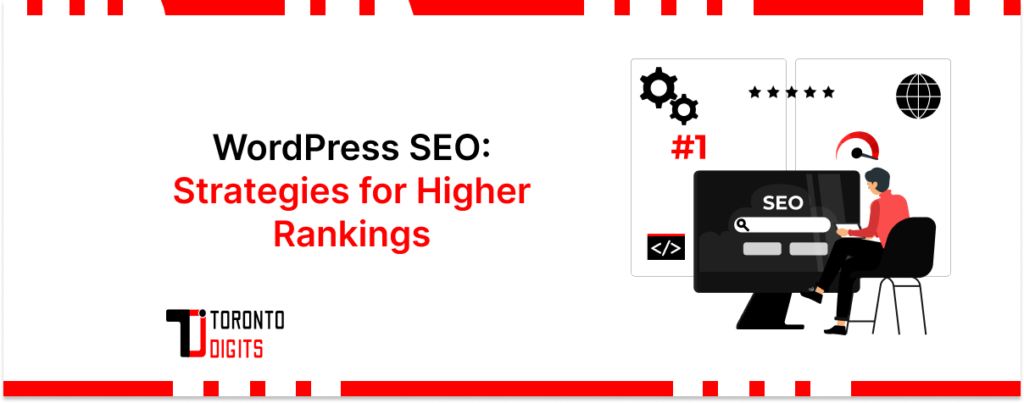In the vast digital landscape, having a WordPress website is just the beginning. The real challenge lies in making it visible to your target audience amidst the sea of online content. This is where Search Engine Optimization (SEO) comes into play.
SEO is the cornerstone of ensuring your WordPress website ranks well in search engine results, driving organic traffic, and maximizing online visibility. In this article, we’ll get into actionable strategies—like using the right SEO tools, implementing SEO via image compression, and installing effective SEO plugins—to boost your WordPress website’s rankings and improve its overall SEO performance.
You’ll also learn cross-platform SEO tips to keep your content consistent across the web and insights from an SEO case study to understand what works in real scenarios.
1. Technical SEO Foundation
Optimize Permalinks
Permalinks are the permanent URLs pointing to your website’s pages and posts. Crafting SEO-friendly permalinks is crucial for better search visibility. Ensure your permalinks are descriptive, concise, and contain relevant keywords.
Mobile Responsiveness
With the majority of internet users accessing websites via mobile devices, having a mobile-friendly design is paramount. Utilize responsive WordPress themes and ensure your website functions seamlessly across various screen sizes and devices.
Site Speed Optimization
Page loading speed is a critical factor in both user experience and search engine rankings. Implement strategies such as image optimization, caching, and minimizing server response time to enhance site speed and performance.
XML Sitemap Submission
XML sitemaps provide search engines with a roadmap of your website’s structure and content. Submitting your XML sitemap to search engines like Google ensures efficient crawling and indexing of your web pages.
Structured Data Implementation
Implementing structured data markup enhances the understanding of your content by search engines, leading to rich snippets in search results. Utilize plugins or schema markup to add structured data to your WordPress website.
Also Read: Shopify SEO: Expert Tips for Better Rankings
2. On-Page Content Optimization
Keyword Research
Conduct thorough keyword research to identify relevant search terms and phrases for your niche. Incorporate these keywords naturally into your content to improve its relevance and visibility in search results.
Title Tags and Meta Descriptions
Craft compelling and descriptive title tags and meta descriptions that entice users to click through to your website. Include target keywords strategically while maintaining readability and relevance.
Content Quality and Structure
Create high-quality, valuable content that addresses the needs and interests of your target audience. Organize your content logically with clear headings and subheadings to improve readability and user experience.
Headings and Subheadings
Proper use of headings (H1, H2, H3, etc.) not only helps to structure your content but also provides context to search engines about the hierarchy of information on your page. Use headings to outline key points and break up content effectively.
Image Optimization
Optimize images on your WordPress website by adding descriptive alt text and using relevant file names. This not only improves accessibility but also provides additional context for search engines to understand your content.
3. Off-Page SEO Strategies
Link Building
Earn high-quality backlinks from authoritative websites to boost your website’s credibility and authority in the eyes of search engines. Focus on natural link-building tactics such as guest blogging, outreach, and content promotion.
Guest Blogging
Seek opportunities to contribute guest posts to reputable websites within your industry. Guest blogging not only helps to build backlinks but also establishes you as an authority in your field and expands your reach to new audiences.
Local SEO
For businesses targeting a specific geographic area, optimizing for local search is essential. Claim your Google My Business listing, optimize local citations, and encourage customer reviews to improve your local search visibility.
Social Media Promotion
Engage with your audience on social media platforms and promote your website content to increase visibility and drive traffic. Social signals can indirectly impact your SEO efforts by amplifying your content’s reach and generating social proof.
4. Monitoring and Measuring Results
Essential SEO Tools
Utilize tools like Google Search Console, Google Analytics, and third-party SEO plugins to monitor and analyze your website’s performance. These tools provide valuable insights into your site’s traffic, rankings, and user behavior.
Key Metrics to Track
Monitor key metrics such as organic traffic, keyword rankings, conversion rates, and backlink profiles to gauge the effectiveness of your SEO efforts. Track changes over time and adjust your strategies accordingly to achieve better results.
Ongoing Analysis and Adjustments
SEO is an ongoing process that requires continuous analysis and optimization. Regularly review your website’s performance data, identify areas for improvement, and adapt your strategies to stay ahead of the competition.
Conclusion
Effective WordPress SEO is essential for achieving higher rankings and driving organic traffic to your website. By implementing the strategies outlined in this article, you can optimize your WordPress website for better search visibility and ultimately, improve your online presence and business success.
Now it’s time to take action. Start implementing these SEO strategies on your WordPress website today and watch your rankings soar. Remember, SEO is a journey, not a destination. Keep learning, experimenting, and refining your approach to stay ahead in the ever-evolving world of search engine optimization.
Additional Tips
- Use relevant keywords naturally throughout your content to improve search visibility without overstuffing.
- Break up your content into digestible sections with subheadings, bullet points, and images to enhance readability.
- Incorporate internal links to other relevant pages on your website to improve navigation and SEO.
- Aim for comprehensive, in-depth content that provides value to your audience, typically around 2000 words or more.
- Promote your article on social media channels and engage with your audience to increase visibility and engagement.
By following these guidelines and staying committed to your SEO efforts, you can position your WordPress website for long-term success in the competitive online landscape.




